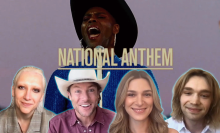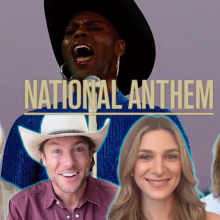There are those in America who would have you believe there is no place in country western culture for LGBTQ+ folk. These people might put forth that the cowboy is the ultimate sign of traditional masculinity. They might suggest that life on a ranch is so hard, it's definitively heteronormative. They might sneer there's no room for drag at a rodeo. Those people will hate National Anthem.
For his feature debut, co-writer/director Luke Gilford found inspiration in his experiences as a queer kid coming up in a rodeo family and his professional photography capturing queer rodeo. National Anthem is a tale not of culture clash but of culture combining. Through the story of a lonely young man, this drama explores a side of Americana that is rural and rhinestones, true grit and truly gay. There, he will not only find his first love, but also himself.
What's National Anthem about?

Charlie Plummer stars as Dylan, an introverted 21-year-old cowboy who works long days in construction to provide for his oft-drunk single mom (Robyn Lively) and his jolly little brother. His life is one of sacrifice. He gives his time, money, and patience to their needs while ignoring his own. That is, until he meets the burly Pepe (Rene Rosado) and the breezy Sky (Bros' Eve Lindley).
Deep down a dirt road in New Mexico, this polyamorous couple owns a ranch called House of Splendor. There, they live with their found family, which includes gay and trans members as well as a nonbinary drag queen with a fairy godmother vibe (The Sandman's Mason Alexander Park). From day one, Dylan can't help but stop and stare in awe of these free spirits, who ride horseback in shimmering gowns, dance about in their underwear unashamed, and laugh loud and proud like no one in his home has ever. But it's radiant Sky who steals his heart.
As the group welcomes him into their fold — and to the queer rodeo where they compete for shiny belt buckles — Dylan begins to come out of his shell. A bit of blue eye makeup there, a no-judgment conversation there, and soon he's happier than his mom has ever seen him. This raises her suspicions, especially as he begins to take his little brother out on day trips with his new friends.
National Anthem is a hazy dream of young love.

The screenplay by Kevin Best, Luke Gilford, and David Largman Murray is light on plot, focusing half-heartedly on Dylan's infatuation with Sky — and to a lesser extent, Pepe. They will flirt, fuck, and share their feelings — with cinematographer Katelin Arizmendi capturing passion and fervent fondling in yearning close-ups. The chemistry between this threesome is heady and hot, reminiscent of European movies of the '60s and '70s, with a glossy polish of perfectly gorgeous leads and a warm color palette that relishes flushed flesh. However, this movie is bigger than their romance — and is not concerned with labeling its characters within the LGBTQ spectrum.
The film gives voice to its reticent protagonist, the kind of cowboy too often overlooked in country western culture. Dylan's longing isn't hidden among the subtext of gunplay, like in Howard Hawks' Red River. His desire has neither twisted him into a vengeful parody of hetero-machismo, like in The Power of the Dog, nor bent him into a muttering, miserable figure of tragedy, as in Brokeback Mountain. And it hasn't instantly transformed him into a glittering gay cowboy icon, like Lil Nas X in "Old Town Road." His journey involves drug store makeup, cheap wigs, and a clumsy yet powerful lip-synch performance. Surrounding Dylan at the rodeo, there is only love — in a dizzying montage of crop tops and cowboy hats, burly bears making out as their belt buckles bump, while a resplendent Black drag queen in a sequined gown and crisp ten-gallon hat sings the national anthem. Rather than offering up a tidy narrative, Gilford gives his audience a safe space that's majestic in its natural beauty of sprawling terrain and the unapologetic glamor and sensuality of its queer rodeo folk.
Therein lies National Anthem's greatest virtue. While many, many narratives of queerness in America — especially those set in traditionally conservative spaces — center on tragedy, National Anthem is about queer joy. There are moments in which this found family shares the heartbreak and ostracism they've suffered from homophobic parents. But these characters are shown as far more than queer and tragic. They are joyous. They are creative. They are resilient. Whether strutting on a stage or communing with a persnickety stallion, they are at home in this place. And we are invited in to experience the bliss of House of Splendor.
Grounded by vulnerable yet effervescent performances, National Anthem is a celebration of rural queerness. It's not a rallying cry, but instead a firm declaration of existence and the pursuit of happiness. Wrapped in the sunny hues of the New Mexican desert and floating on the charisma of a sexy and vulnerable ensemble, this drama charts its own path with clear eyes and queer hearts.
National Anthem is in theaters now.
UPDATE: Jul. 11, 2024, 2:07 p.m. EDT "National Anthem" was reviewed out of the Toronto International Film Festival in this article, originally published on Sept. 14, 2023. The review was updated to contain information about the film's theatrical release.













